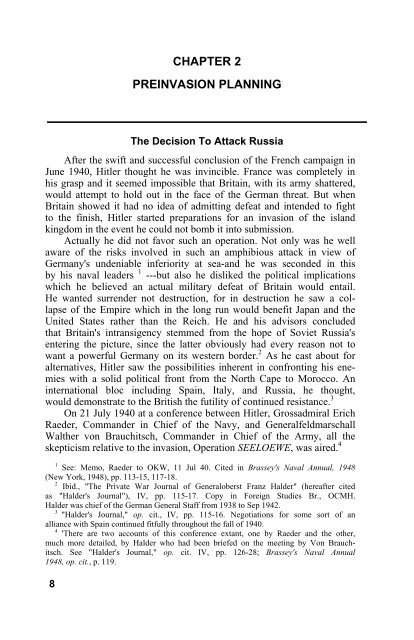the soviet partisan movement 1941-1944 by edgar m. howell
the soviet partisan movement 1941-1944 by edgar m. howell
the soviet partisan movement 1941-1944 by edgar m. howell
Create successful ePaper yourself
Turn your PDF publications into a flip-book with our unique Google optimized e-Paper software.
CHAPTER 2 <br />
PREINVASION PLANNING <br />
The Decision To Attack Russia<br />
After <strong>the</strong> swift and successful conclusion of <strong>the</strong> French campaign in<br />
June 1940, Hitler thought he was invincible. France was completely in<br />
his grasp and it seemed impossible that Britain, with its army shattered,<br />
would attempt to hold out in <strong>the</strong> face of <strong>the</strong> German threat. But when<br />
Britain showed it had no idea of admitting defeat and intended to fight<br />
to <strong>the</strong> finish, Hitler started preparations for an invasion of <strong>the</strong> island<br />
kingdom in <strong>the</strong> event he could not bomb it into submission.<br />
Actually he did not favor such an operation. Not only was he well<br />
aware of <strong>the</strong> risks involved in such an amphibious attack in view of<br />
Germany's undeniable inferiority at sea-and he was seconded in this<br />
<strong>by</strong> his naval leaders 1 ---but also he disliked <strong>the</strong> political implications<br />
which he believed an actual military defeat of Britain would entail.<br />
He wanted surrender not destruction, for in destruction he saw a collapse<br />
of <strong>the</strong> Empire which in <strong>the</strong> long run would benefit Japan and <strong>the</strong><br />
United States ra<strong>the</strong>r than <strong>the</strong> Reich. He and his advisors concluded<br />
that Britain's intransigency stemmed from <strong>the</strong> hope of Soviet Russia's<br />
entering <strong>the</strong> picture, since <strong>the</strong> latter obviously had every reason not to<br />
want a powerful Germany on its western border. 2 As he cast about for<br />
alternatives, Hitler saw <strong>the</strong> possibilities inherent in confronting his enemies<br />
with a solid political front from <strong>the</strong> North Cape to Morocco. An<br />
international bloc including Spain, Italy, and Russia, he thought,<br />
would demonstrate to <strong>the</strong> British <strong>the</strong> futility of continued resistance. 3<br />
On 21 July 1940 at a conference between Hitler, Grossadmiral Erich<br />
Raeder, Commander in Chief of <strong>the</strong> Navy, and Generalfeldmarschall<br />
Wal<strong>the</strong>r von Brauchitsch, Commander in Chief of <strong>the</strong> Army, all <strong>the</strong><br />
skepticism relative to <strong>the</strong> invasion, Operation SEELOEWE, was aired. 4<br />
1 See: Memo, Raeder to OKW, 11 Jul 40. Cited in Brassey's Naval Annual, 1948<br />
(New York, 1948), pp. 113-15, 117-18.<br />
2 Ibid., "The Private War Journal of Generaloberst Franz Halder" (hereafter cited<br />
as "Halder's Journal"), IV, pp. 115-17. Copy in Foreign Studies Br., OCMH.<br />
Halder was chief of <strong>the</strong> German General Staff from 1938 to Sep 1942.<br />
3<br />
"Halder's Journal," op. cit., IV, pp. 115-16. Negotiations for some sort of an<br />
alliance with Spain continued fitfully throughout <strong>the</strong> fall of 1940.<br />
4 'There are two accounts of this conference extant, one <strong>by</strong> Raeder and <strong>the</strong> o<strong>the</strong>r,<br />
much more detailed, <strong>by</strong> Halder who had been briefed on <strong>the</strong> meeting <strong>by</strong> Von Brauchitsch.<br />
See "Halder's Journal," op. cit. IV, pp. 126-28; Brassey's Naval Annual<br />
1948, op. cit., p. 119.<br />
8
















